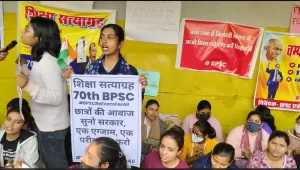Sandeep Pandey, Seema Muniz and Gopal Krishna Verma
Some people are disheartened with the disruption in children’s education due to the menace of Covid and the successive lockdowns. While a number of children are getting used to attending online classes, their counterparts from the weaker socio-economic backgrounds continue to struggle either because of unfamiliarity with technology or because of having to share a single device with their siblings and/or parents. More unfortunate ones have been completely pushed out of the system which has resulted in the virtual drop in the rate of enrolment.
Despite the unforeseen severance in the accepted paradigm of education, the positive trend to have emerged from this chaos, is cancellation of examinations, sending a wave of relief amongst the students as well as their parents. (The only disappointed lot are the parents, who feel robbed off the glory their kids bring by acing the exams.) It may have been inconceivable before Corona to think of an examination-free education system, but now we are coerced into exploring the possibility of such an option. Just imagine how much unnecessary stress it will save the children, parents and teachers, while freeing up time to pursue personal interests and hobbies.
It is high time that examinations be recognised as the biggest scam in education. And this is not in referral to the mass-copying, or buying the certificate in Board examinations at the Class X and XII level, or several other malpractices employed to clear the finals. In fact, as a civilised society, we should be questioning the very raison-d’être of this unnecessary evil of the prevailing system. Why do we need examinations? A teacher should be the best judge of a student’s level of understanding. An evaluation, if at all, should be assignment-and-participation based instead of the one based on written/oral tests. As Albert Einstein once said while elaborating on how a student’s overall performance is a far better gauge of her efforts and abilities. “The teachers’ impression of a student derived during the school years, together with the usual numerous papers from assignments, which every student has to complete, are a succinctly complete and better basis on which to judge the student than any carefully executed examination.
Moreover, if we are truly interested in children succeeding in school then the need of the hour calls for an education rich in content and relevance, accomplished through quality instructional time. Unfortunately, as the use of testing becomes the norm to evaluate students, more and more classroom time is being dedicated to helping kids prepare for the examination, which can often result in a narrowing of the curriculum. And, if we are interested in success for ALL children then we need to be aware that the current testing regime does nothing to address social and economic inequalities; it only reinforces them.
Last but not the least, examination represents a cruel process of elimination. Why should any child be eliminated from her birthright of getting an education? If the purpose of education is learning, then the task of a teacher is to ensure that the students learn, irrespective of the time and effort it might require. For the fact remains that an examination system introduces competition, which in turn kills the spirit of learning. It prioritises individual achievement over collaborative learning, thus defeating the very premise of education with its accent on cooperation over competition. Creating an environment, where every existing member is both a teacher and a student, presents a momentous opportunity to continually learn, not only from each other but also from every situation. Once such dynamics are evolved, even an interaction with everyday people, such as the milkperson, gardener, farmer, craftsperson, musician, etc. can transform into a mutually enriching learning experience and help develop skills which go beyond the drab walls of a classroom.
The damage being done by a culture of education built around examinations can be observed both on the surface as well as at the subliminal level. While on the surface, it automatically divides the children into achievers and non-achievers from a young age, at the subliminal level its effects can be traumatizing to say the least, resulting in a complete erosion of self-confidence for some, and brutalization of personality for others.
Since the model of modern education finds its roots in the industrial revolution, it tends to treat an individual as a product, and educational institutions as brands and together they navigate the existing job market. Interestingly, it is hardly unusual that education itself has become a vast market up for grabs for the affluent. Educational institutions, especially the coaching centers which at times don on the dual responsibility of coaching as well as ‘education,’ have become mechanical factories which are expected to produce a definite quality of product. Commercialisation has led to mechanization which has harmful effect over human intellect and emotions.
Again Covid has coerced us to pause and rethink the way we have shaped our concept of education. Do we really have to mass educate? Luckily, with an inadvertent by-product of Covid being social distancing, in a school environment it has paved the way for fewer number of students per classroom. This, in turn, should hopefully result in a more empowering teacher/student relationship and put the brakes on the mechanised version of teaching that we see today. This model would very much be in sync with the one pioneered by our ancient gurukuls. Certainly such a model calls for many more qualified and dedicated teachers. But if this is the model which will save us from the menace of Covid then we should also consider this as the model to save us from the disaster called education.
(Sandeep Pandey is General Secretary of Socialist Party (India), Seema Muniz is a blogger and an artist who homeschooled her child and Gopal Krishna Verma is a socio-political thinker.)




